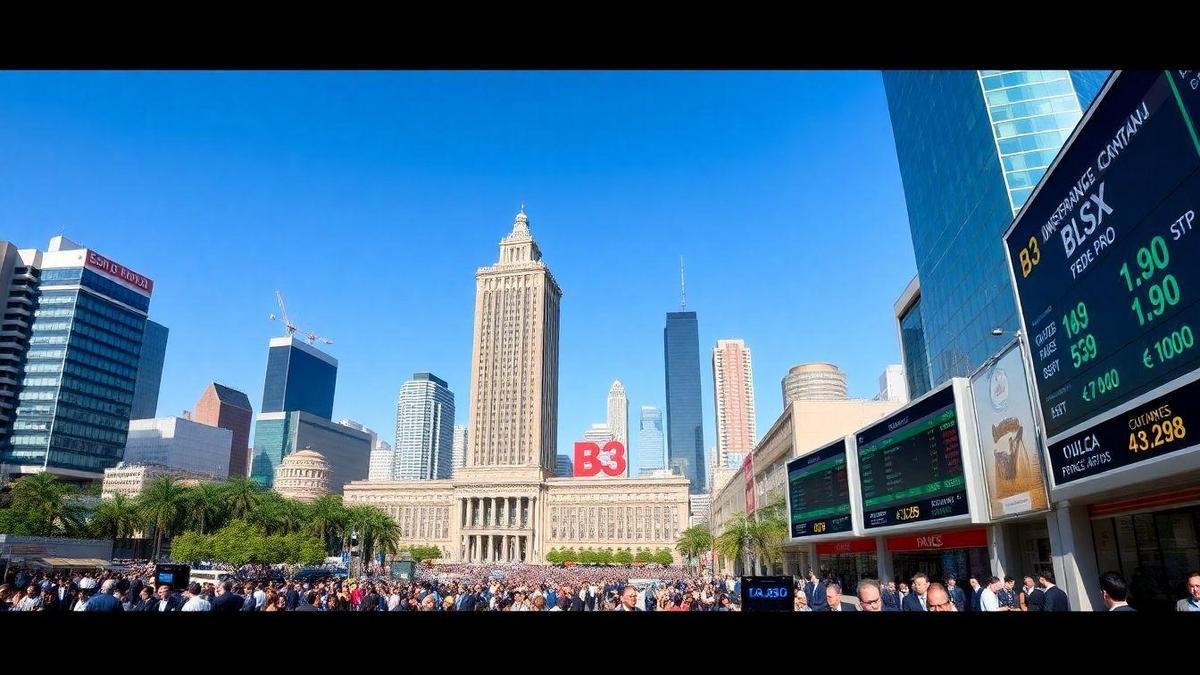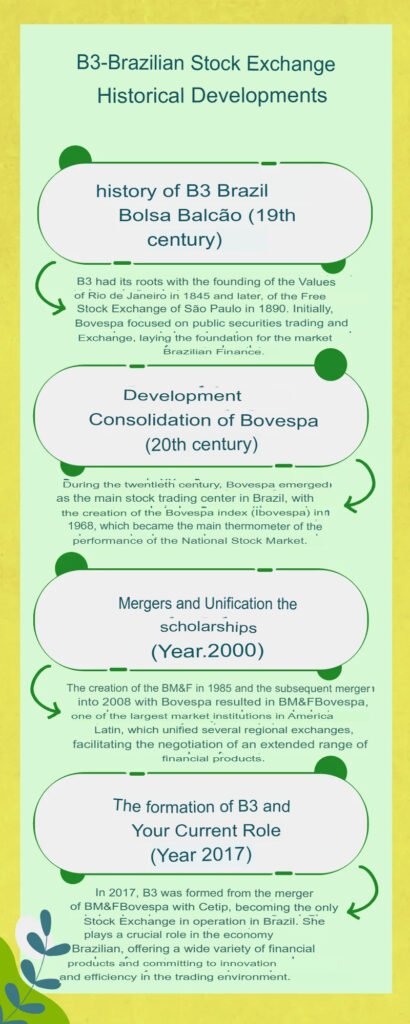Table of Contents
What is the B3 and How Does It Work?
The Brazilian Stock Exchange, B3, is Brazil’s main financial institution for trading assets such as stocks, fixed income securities, derivatives, and other financial products. Founded in 2017 from the merger between BM&FBOVESPA and CETIP, B3 has established itself as one of the largest financial markets in Latin America.
Its operations are based on an electronic system that securely and efficiently connects investors and companies. This system ensures the liquidity and transparency needed for the proper functioning of Brazil’s financial market. Additionally, the Brazilian Stock Exchange plays a crucial role in the economy by facilitating access to capital for companies and offering investment opportunities for both retail and institutional investors.
Understanding what the B3 is is essential for anyone looking to invest in Brazil’s financial markets. It is the primary gateway for investors looking to diversify their portfolios and participate in the growth of publicly traded companies. Therefore, the B3 is a cornerstone of Brazil’s financial system.

History and Evolution of B3: From the Past to the Present
The history of B3 is rich and long, marked by various transformations that have followed the development of Brazil’s financial market. To understand B3 today, it is important to know its journey:

- Currently: This history showcases the continuous evolution of the Brazilian financial market and the central role that B3 plays in this development. The B3 continues to adapt to global market changes, striving to offer a more efficient, secure, and transparent trading environment.
How Does the B3 Work?
The B3 functions as an organized market where buyers and sellers trade financial assets. Its primary goal is to provide a safe and transparent environment for these transactions, ensuring that all trades are registered and regulated.
The process begins with the investor placing an order through a brokerage, which sends it to B3’s trading system. The system then matches the order with a buyer or seller who agrees to the terms. Once the transaction is confirmed, settlement occurs, meaning the transfer of assets and funds between the parties.
Some of B3’s key functions include:
- Transaction Settlement: Ensuring payments and asset transfers are properly executed.
- Custody of Assets: Safeguarding investors’ assets.
- Market Information: Providing data on prices, volumes, and market conditions.
Additionally, B3 plays a role in maintaining market integrity, monitoring operations, and penalizing illegal activities. It also has an educational function, promoting initiatives to teach investors about the financial market and its dynamics.
Key Products and Services of the Brazilian Stock Exchange (B3)
B3 offers a wide range of products and services to meet the needs of various investor profiles. Some of the most relevant include:
- Stocks: Representing small fractions of a company’s capital, stocks are the most popular assets among investors.
- ETFs: Index funds that provide diversification at a low cost.
- Fixed Income: Securities like bonds, certificates of deposit (CDBs), and government bonds traded on the B3.
- Derivatives: Futures contracts and options used for hedging or financial leverage.
Each product has specific characteristics that cater to different financial goals, from capital preservation to seeking higher returns with greater risk.
Investing in the B3: First Steps and Strategies
To start investing in the B3, the first step is to open an account with a brokerage firm. The broker will act as an intermediary between the investor and the B3, providing access to trading platforms. Next, it’s crucial to define investment goals and risk tolerance to select the most suitable assets for your portfolio.
There are various investment strategies that can be used on the B3, ranging from long-term investments in solid companies’ stocks to short-term trading aiming to profit from market volatility. It’s essential to study and gather information on different types of investments and strategies before making decisions.
Investing in the B3 requires knowledge and discipline. Monitoring the market, analyzing company performance, and diversifying your portfolio to mitigate risks are key practices. Additionally, it’s advisable to consult a qualified professional, such as an investment advisor, to help with decision-making.
Companies Listed on the Stock Exchange
Currently, there are hundreds of Brazilian companies listed on B3. Additionally, several international companies allow investment through BDRs (Brazilian Depositary Receipts), significantly expanding options for investors.
Every year, new companies list their shares on the Stock Exchange, making them publicly traded entities. A good way to follow the leading companies on B3 is through the Ibovespa Index. The Ibovespa is the most important index on the Brazilian Stock Exchange and is used to report market movements in the media.
The Ibovespa index is updated every four months, with the latest composition valid from May 6, 2024, to August 30, 2024, including 86 stocks from 83 Brazilian companies.
The top five stocks with the highest weight in the Ibovespa are:

Vale ON (VALE3): 13.304%
Petrobras PN (PETR4): 8.554%
Itaú Unibanco PN (ITUB4): 7.168%
Petrobras ON (PETR3): 4.242%
Banco do Brasil ON (BBAS3): 3.766%
You can view the full list of companies included in the Ibovespa on the official B3 website.
The Ibovespa index is a theoretical portfolio of the most traded stocks on B3. It is considered an important indicator of the average performance of Brazilian stocks and can also reflect the overall health of the country’s economy.
Reference Index
It’s worth noting that the Ibovespa is often used as a benchmark index for comparing the performance of other theoretical investment portfolios, equity funds, and ETFs.
As a traditional and widely used indicator in Brazil’s capital markets, fund managers often aim to outperform the Ibovespa. Investors, in turn, use the index to evaluate their investment returns.
Risks Associated with Investing in B3
While opportunities for gains exist when investing in B3, it’s essential to carefully consider the risks involved. Some of the primary risks include:
- Volatility: Asset prices can fluctuate significantly in short periods, impacting the value of investments.
- Market Risk: Changes in the economy, politics, or global factors can negatively affect asset performance.
- Lack of Knowledge: Investors who don’t understand market dynamics may make impulsive and detrimental decisions.
Therefore, it’s critical for investors to be prepared for market fluctuations and have a well-defined investment strategy. It’s also highly recommended to stay informed about market news and events that could impact the market. By doing so, it’s possible to minimize risks and take advantage of the opportunities the B3 offers.
To Remember: Final Insights on B3
The B3 is undoubtedly a fundamental institution for Brazil’s financial market and economy. It offers a wide array of products and services for investors of all profiles and plays a key role in financing companies and supporting the country’s development. However, investing in B3 requires knowledge, discipline, and planning.
To recap some key points from this article:
- The B3 is Brazil’s official stock exchange, where stocks, fixed income securities, derivatives, and other financial assets are traded.
- B3 offers a comprehensive infrastructure for the financial market, ensuring the security and efficiency of transactions.
- Investing in the B3 involves risks and opportunities, and careful consideration of these aspects is crucial before making any decisions.
- Opening an account with a brokerage is necessary to start investing in B3.
- Diversifying your portfolio and seeking information are vital strategies for success in investing.
- B3 plays a critical role in the development of Brazil’s economy by driving company growth and democratizing access to the investment market.
This article aims to provide you with a thorough overview of B3, helping you understand Brazil’s capital market better and make more informed investment decisions. Always seek up-to-date information and consult qualified professionals before investing your money.
Want to take your financial knowledge even further? 📚💡 Check out our other posts for expert insights, practical tips, and strategies to help you build a secure and prosperous financial future. Explore More Now!
- Caixa Launches Fun Money Game on Roblox
- Easy Ways to Get Robux in Roblox
- Get Free Roblox Items This March
- How to Earn Free Robux Online
- 🍔 Why McDonald’s Became a “Luxury Meal”: The Real Reason Behind the Prices (And How to Beat Them in 2025)
